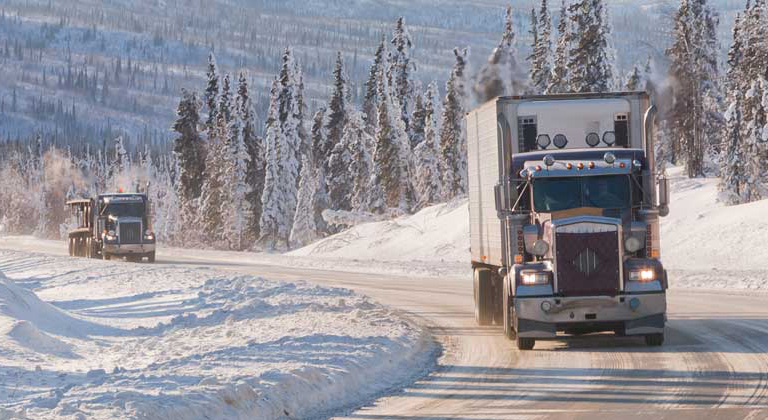Keep your drivers safe in any weather
Help your drivers respond quickly and correctly to hazardous weather and road conditions.
Each year, more than 1.25 million roadway vehicle crashes are caused by adverse weather-related road conditions.* To help keep your drivers safe, train them to properly respond to common weather scenarios.
High wind
Be alert for high winds on bridges and overpasses
Be cautious when driving next to another truck that might be blocking the wind
Avoid passing other vehicles if possible—and watch for drivers who may be trying to pass
Watch out for blowing debris on roadways
Keep both hands on the steering wheel to help maintain control
Always buckle your seat belt
Properly secure cargo loads according to the North American Cargo Securement Standards—required under federal and state statutes
Stay tuned to state Department of Transportation traffic managers for high wind warnings
Always pull off the road and take shelter immediately during a tornado warning or a hurricane
Rain, snow, and ice
Slow down—trucks can hydroplane at only 35 mph
Increase following distance to give yourself space to react to emergencies
Avoid passing other vehicles or driving beside them in a pack
Be courteous to other vehicles and conscious of water spray you generate from your tires
Follow state guidelines that require chains on your tires during certain conditions
Don’t rely on tire chains to prevent sliding—they’ll help with traction but won’t stop your truck if it begins to slide
Winter weather
Be aware of local regulations that limit or prohibit idling. A common practice in cold weather country is to let the truck engine idle while sleeping, going in to a truck stop to eat, or while loading or unloading. Drivers need to be aware that while the engine may be warm and the oil may be flowing freely, the grease in the wheel hubs, transmission, and differentials is cold and stiff. Inadequate lubrication can cause overheating and lead to severe problems. Start out slowly in cold weather conditions to allow lubricants time to warm up and become fluid.
As a general practice, equip each vehicle with the following items during winters:
Ice scraper and snow brush
Flares and reflectors
Blankets
First aid kit
Shovel
Sand, gravel, or clay oil absorbent
Flashlight with extra batteries
Matches or lighter, candle
Nonperishable food items
Booster cables
Tire chains
At Sentry, we have coverages that can help you protect your drivers and your business. Find an agent to get the conversation started.
*Source: Ten-year averages from 2005 to 2014 analyzed by Booz Allen Hamilton, based on National Highway Traffic Safety Administration (NHTSA) data.
Property and casualty coverages are underwritten, and safety services are provided, by a member of the Sentry Insurance Group, Stevens Point, WI. For a complete listing of companies, visit sentry.com. Policies, coverages, benefits, and discounts are not available in all states See policy for complete coverage details.
The information contained in this document is of a general nature and is not intended to address the circumstances of any particular individual. IT IS DISTRIBUTED “AS-IS”, WITHOUT ANY WARRANTIES. NO MEMBER OF SENTRY INSURANCE GROUP WILL BE LIABLE TO ANY PERSON OR ENTITY WITH RESPECT TO ANY LOSSES OR DAMAGES CAUSED, OR ALLEGED TO HAVE BEEN CAUSED, DIRECTLY OR INDIRECTLY BY THIS DOCUMENT, REGARDLESS OF WHETHER SUCH CLAIM IS BASED ON CONTRACT, WARRANTY, TORT (INCLUDING NEGLIGENCE AND FOR PROPERTY DAMAGE AND DEATH) OR OTHER GROUNDS.
Download the guide
Keep your drivers safe in any weather / PDF







